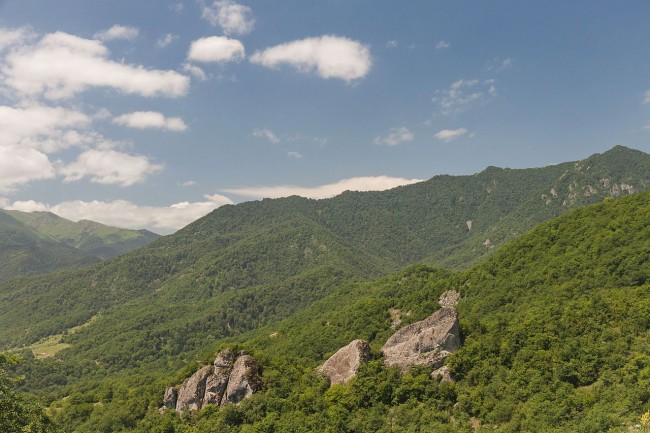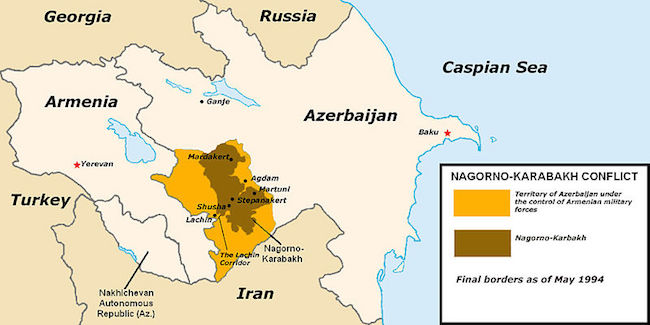
By Rusif Huseynov
Long-boiling tensions between Armenia and Azerbaijan flared again on April 2, 2016, with dozens of soldiers and civilians from both sides killed in fighting.
The theater was centered in Nagorno-Karabakh, an Azerbaijani region occupied by Armenian forces. Nagorno-Karabakh, plus several more districts beyond the region have been controlled by ethnic Armenian separatists since a war that ended in 1994. Although cross-border violence had always been a usual phenomenon despite the 1994 truce, annually claiming dozens of lives from both sides, the recent clashes have been the most severe escalation which almost transformed into a full-scale warfare over the two decades.
The Armenian and pro-Armenian media ignited mass hysteria regarding Azerbaijan`s military operation and labeled it Azerbaijan`s attempt to break the peace in the region.
If you ever google the map, you`ll see that Azerbaijan was actually striving to regain the control over the region inside its internationally recognized borders. That region became separated from the mainland in the 1990s, when the separatist movement backed by external forces claimed independence. This conflict was accompanied by brutal warfare (when the Armenian troops committed the Khojali massacre, one of the most tragic events in contemporary world history) and ethnic cleansing (the entire Azerbaijani population of the occupied provinces, some one million people were forced to leave their homes).
Similar scenarios were simultaneously or later played in other post-Soviet countries such as Moldova (Transnistria), Georgia (Abkhazia and South Ossetia), and most recently Ukraine (Donbass). A bunch of people citing ethnic problems and receiving external aid separated some region from the control of the central government. Independence proclaimed in those regions virtually made them black holes across the post-Soviet space as they could never secure international recognition.
The same situation has been lasting in Azerbaijan even longer. For over 20 years the Armenian separatists have been claiming to have an independent state in Nagorno-Karabakh. Yet this independent state is nothing but a laughable imitation of statehood since Nagorno-Karabakh is so strongly depending on the Republic of Armenia politically, economically and militarily that it operates merely as a province of the Republic of Armenia.
Therefore, amid the Armenian hysteria about the murdered Armenian soldiers in Nagorno-Karabakh, we should reformulate more correct questions: Did the Azerbaijani army cross the internationally recognized border of another state? What do the Armenian soldiers do in Nagorno-Karabakh – inside the internationally recognized territory of Azerbaijan? Even the Azerbaijani President warned that the Armenian soldiers should leave the Azerbaijani lands unless they want to die there. Would any country in the world, including the mediators in the conflict, the United States, Russia or France, ever tolerate the occupation of their own territories? Would they fight back the invaders or let international mediators solve relevant conflicts?

The map and borders of Azerbaijan, like those of other countries, were recognized and reconfirmed by the UN upon Azerbaijan`s admission into organization in 1992. The Republic Armenia itself accepted the territorial integrity of other countries, including Azerbaijan, when getting admitted to the United Nations in 1992. Furthermore, four resolutions of the UN Security Council (822, 853, 874, 884), as well as resolutions and documents adopted by many international organizations have recognized the territorial integrity of Azerbaijan and demanded immediate, complete and unconditional withdrawal of Armenian forces from the occupied territories of Azerbaijan. The documents of respected organizations have always been ignored by Armenia and remained unfulfilled up to day. Azerbaijan has repeatedly brought to the attention of the international community that the illegal presence of Armenian armed forces in the occupied territories of Azerbaijan provokes further escalation of situation, and poses a threat to regional peace and stability. Therefore, it is not quite understandable how Armenia, itself breaking international law and ignoring international documents, demand international community prevent Azerbaijan from reinstating its territorial integrity?
Any military operations of the Azerbaijani army, the recent one or possible ones in the future, would be nothing but a justified attempt to repair the broken territorial integrity. Desperate calls of different countries and organization to stop the operation are signs of double standards. Russia, which bombed Chechens when they stood for independence and did not let a new country arise within Russia, tries to broker peace in the region at the expense of territorial loss for Azerbaijan. Or didn’t the international community protest the separatist forces in Eastern Ukraine and express support for Ukraine`s territorial integrity?
The goal of the Armenian side is clear: to preserve the status-quo as long as possible, to extend endless negotiation processes, have the world community get used to the situation that Nagorno-Karabakh is under Armenian control.
To put everything into a more understandable language, just imagine a neighbor of yours occupies one of three rooms in your apartment. You cannot simply kick that person out because other neighbors interfere this situation and, as intermediates, demand you find some compromise with the occupier (sic) and possibly give him that room.
In order to achieve some progress in the settlement of this conflict, the Armenian armed forces must be withdrawn from the occupied territories of Azerbaijan, and the territorial integrity and sovereignty of Azerbaijan within its internationally recognized borders must be secured.
The military occupation of one territory by another country is not acceptable in the 21st century. Nor acceptable could be the tolerance of international community to this situation. This status-quo prevents the development processes in the South Caucasus and poses a great threat to the entire security system in Eastern Europe.
The international community must finally have its say, demand Armenia stop the occupation of Azerbaijani territories and even consider sanctions against the former; it already imposed sanctions on Russia when the Kremlin broke the territorial integrity of Ukraine and kept supporting the separatists in Eastern Ukraine…
The international mediators stepped up again, allegedly to help. But there is little hope that they would ever be interested in solving this problem. However, the further attempt of Armenia and intermediates to maintain the Nagorno-Karabakh situation frozen will fail. The thaw has started…




